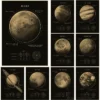Gazing up at the night sky, stargazers recognize Venus as Earth’s dazzling twin. It beams brighter than any star, earning nicknames like the Morning or Evening Star. Yet behind celestial similarities hide profound mysteries about our nearest neighbor’s topsy-turvy spin.
Most planets rotate counter-clockwise as viewed facing the sun – a vestige of the primordial cloud collapse that birthed our solar system. Just as swirling gas and dust flattened into planets revolving in shared alignment, Venus should spin synchronously with its neighbors.
Instead the hot, cloud-swaddled orb rotates backwards at an agonizingly slow pace. A Venusian day-night cycle takes 243 Earth days, outlasting even its 225 day orbit. What dramatic events set planet Venus rotating ass-backwards and sluggishly while Earth spins harmoniously aligned? Numerous theories vie to explain the planet’s flip.
Clues Written in the Heavens
Scientists propose several hypotheses for Venus’s odd motion based on broader evidence within the solar system. Giant collisions frequently marked planets’ unruly formation, indicated by immense craters still visible.
Astronomers speculate early impacts essentially tipped Venus upside-down and reversed its spin. Supporting this, they cite Neptune’s wildly tilted axis, suggesting a long-ago cosmic smash-up. An analogous collision could have likewise spun Venus backwards initially.
Researchers also theorize gravitational forces recorrected Venus’s orbit over time. But its reversed rotation remained locked, an enduring imprint of that ancient, planet-tilting blow.
Slowing Down Over Time
Venus’s sluggish spin likely intensified following its axial inversion. Solar tides provide one explanatory model, similar to how our moon gradually recedes from Earth. The sun’s gravitational pull creates tidal bulges on Venus, generating internal friction that drains rotational velocity. Already spinning backwards, Venus continued braking as each blazing-hot day stole away more momentum
Dense, runaway greenhouse atmospheres may also slow planet spins through weather-related friction. Venus’s pancake-flat topology adds further drag. Already retarded by past reversals and tidal forces, the planet’s dense gases and languid landscape finished arresting planet Venus into a virtual standstill.
A Dire Warning Written in Runaway Climate Change
For all its wonders, Venus serves as a cautionary example of climate change’s ravages for planets like Earth. Once perhaps milder and wetter as inferred through geology, runaway greenhouse warming made surface water impossible. Now crushing air pressures and scorched wastelands bake below scattered sulfuric clouds.
This post-apocalyptic vision of hell on Earth illustrates planetary tipping points and climate stability found at Earth’s precarious Goldilocks orbital niche. As humanity aggressively warms our planet, leaders look to Venus as decisions loom to avert catastrophe. Just as myths warn of Icarus flying too near the Sun, Venus’s reversed fate embodies daring Earth’s own orbital tightrope walk toward fiery oblivion.
So while its inverted spin remains enigmatic, greater mysteries still shroud Venus’s history and future. What primordial forces set cycles of life and death, rotation and dissolution in motion across the cosmos? Perhaps one day, understanding wayward Venus will guide revelations into Earth’s destiny as well.



